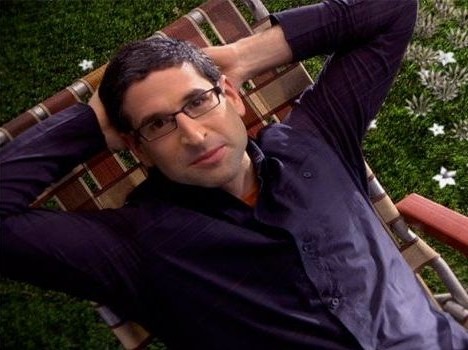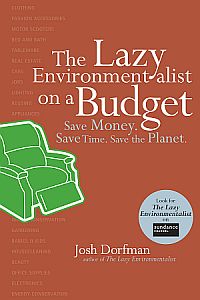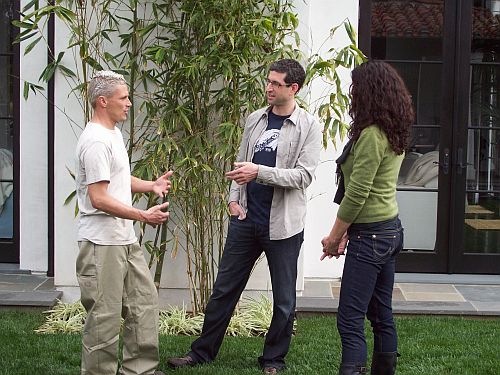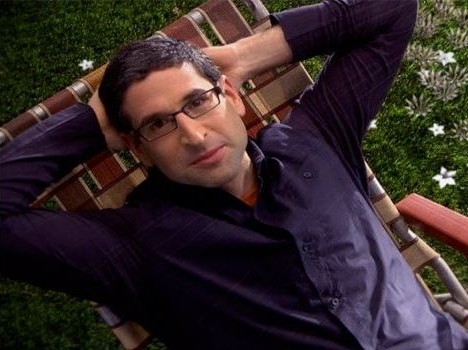“You can guilt-trip me and you can moralize and you can gloom-and-doom about it, but there are probably certain behaviors I have that I’m just not going to change. But if you presented me with solutions … if we can figure out ways to reduce my impact — that I can afford — great! I’m going to do them … I don’t necessarily think that’s a good thing, but I think that this is the reality and there are probably hundreds of millions of Americans who feel like I do. I’m a lazy environmentalist.”
— Josh Dorfman
 And thus was born the brand that has spawned a blog, a (now defunct) radio show, two books (and counting), a Sundance Channel Green television series that premieres tonight at 9 p.m. — and a ray of hope for couch potatoes everywhere.
And thus was born the brand that has spawned a blog, a (now defunct) radio show, two books (and counting), a Sundance Channel Green television series that premieres tonight at 9 p.m. — and a ray of hope for couch potatoes everywhere.
But the man known as the Lazy Environmentalist is certainly no sloth himself. In fact, Josh Dorfman has been so busy writing and researching and talking and filming that he’s hardly had time to devote to his first green venture, a high-end sustainable furniture store called Vivavi.
It was a coworker from Vivavi, actually, that prompted Dorfman’s first use of the “lazy environmentalist” phrase, when he was accused of not being an environmentalist at all (despite his sustainable shop) because of bad habits like long, hot showers. (Which he still refuses to give up — they help him think, OK?)
Now Dorfman is dedicated to cutting out the typical green-minded guilt-trip crap and helping people find eco-solutions that not only fit their lifestyles but improve them. He’s still coming to terms with what kind of role he’s playing in this movement, but says maybe he’s less journalist/media personality and more “change agent.” Change that sticks, that is, and spurs more change — because it just makes sense.
Here’s what Dorfman had to say about his ever-evolving eco-philosophy:
Q. Can laziness really save the world? Because that would be great news.
A. [Laughs] I would say no. Laziness probably can’t save the world. But I do think that there are many ways to reduce the impact that our lives have on the planet right now, so it seems foolish to not take advantage of them and instead to be waiting for some future technology that may or may not materialize.
Q. How about this: Can we save the world by buying things?
 A. What I think we have to do as a society, as a country, as a civilization, is we have to bring our lifestyles into balance with nature. All of us consume something, almost every day … we have to do whatever we can to reduce the impact of that consumption. What gets us to solution is a combination of the right laws and policies coupled with greater transparency in the marketplace so that people have a greater sense of the impact of their purchasing decisions. Business is playing a role in that too.
A. What I think we have to do as a society, as a country, as a civilization, is we have to bring our lifestyles into balance with nature. All of us consume something, almost every day … we have to do whatever we can to reduce the impact of that consumption. What gets us to solution is a combination of the right laws and policies coupled with greater transparency in the marketplace so that people have a greater sense of the impact of their purchasing decisions. Business is playing a role in that too.
I just focus on the consumer side of [this issue] because, to me, the other things aren’t working fast enough. I think that we’ve had some major, major strides in terms of environmental policy, but at the same time, when you look at our environmental organizations — be it Sierra Club or World Wildlife Fund or the Nature Conservancy, you name it — they may have millions of members, and that’s phenomenal, but there are 300 million Americans. So how do you gauge the other 280-290 million Americans who aren’t in these organizations? How do you reduce the impact of their behavior, because that’s really the key. That’s what I’m trying to focus on.
Q. You’re a spokesperson for Brita and for Clorox’s Green Works line. How did that come about? Did you have any hesitation about lending your name to big corporations?
A. Well, it’s something that I think a lot about. When [my first book] came out in 2007, Brita approached me about becoming their spokesperson for their FilterForGood campaign. … [It’s] a tremendous campaign. There are lots of campaigns to raise awareness about bottled water, but to be able to be involved with a company like Brita in a larger corporation, you create a bigger platform … you’re able to be a part of something that can have a broad impact across a wide swatch of our society.
As I’ve thought it through, I’ve come to feel that if it sits with me as a solution that I think is substantively better than the conventional choice, then that’s something I can get pretty excited about getting behind.
As we transform our economy — which I really believe is what we have to do — into sustainability, I just think that these large corporations are going to be part of that change. They have to be. Some of them will go out of business, but most of them are going to be here and they have to transform. These are the steps corporations have to take to transform and sometimes it’s hard for us as environmentalists to operate in this gray area. We want to see the world in terms of good guys and bad guys, black and white, and that’s not a luxury that we have if we’re really serious about creating change that’s going to make a real difference.
Q. I recently reviewed a number of natural toilet-bowl cleaners, and Clorox Green Works was the winner — doing the best job for the cheapest price. But a lot of readers commented about how they are skeptical of Clorox and don’t want to support the company because of the other products they put out.
A. I think sometimes we get caught up in trying to make the perfect choice. So we argue back and forth saying, “Am I going to support Green Works? Am I going to support Seventh Generation? Am I going to support Mrs. Meyers?” And my feeling is “Great! Support it! Do it!”
But for folks who happen to really love Clorox and trust Clorox, and have Clorox as a valued brand … I’ve talked to those folks, too, and they have been like, “Hey, I love Clorox, and I’m really psyched that they gave me an option, because I trust them. If they’re doing something green, then I’m going to trust that it’s going to work.” So there are all kinds of way to look at it.
We ought to be saying, “Here’s all the good ones; whatever choice you want to make in the good camp, great!” Let’s focus on the other products that aren’t so good, instead of infighting to try to get the perfect choice.
Q. Do you personally test all of the products and services that you recommend in your blog and in your books?
A. I vet as much as I possibly can, personally. … [But] there’s no science to it, so I do spend a lot of time really trying to think through, “Is this a choice that really moves the ball forward and is this an area … that’s worthwhile to focus on?”
Q. I read that your “epiphany” came about when you realized all of China’s bicyclists would turn into drivers. How do you see gently greening U.S. consumers as a fix to rapidly escalating international problems? Is what you’re doing really addressing some of these big, urgent issues?
A. I think it is addressing the issues; as an environmentalist and someone who is very, very concerned about these issues, the question that I have in the back of my mind — which is sometimes in the front of my mind — is, “are we going fast enough?” I mean, that’s the big question. … We probably don’t have time, but the challenge is that there’s the cultural reality where we’re not really willing to embrace the fact that we’re in a crisis. We’re just not. We’re not willing to take the steps that we would take if we were really listening to the science.
Q. Are we letting people feel like they’re doing something great by making one or two different purchasing decisions or lifestyle habit changes — when in reality, it’s not enough?
 Dylan Dyer, (host) Josh Dorfman, and Cym Warkov filming the “lazy landscaper” episode of “The Lazy Environmentalist.”Photo: Eric SenchuckA. This isn’t about one change; this isn’t about just unplugging your cell-phone device. That’s not what this is about. This is about saying that there is so much rapid innovation taking place that one could transform almost their entire life and be living perhaps a higher quality lifestyle, more affordable, while at the same time reducing their environmental impact. I truly believe that. I’m not like a one-small-step kind of guy.
Dylan Dyer, (host) Josh Dorfman, and Cym Warkov filming the “lazy landscaper” episode of “The Lazy Environmentalist.”Photo: Eric SenchuckA. This isn’t about one change; this isn’t about just unplugging your cell-phone device. That’s not what this is about. This is about saying that there is so much rapid innovation taking place that one could transform almost their entire life and be living perhaps a higher quality lifestyle, more affordable, while at the same time reducing their environmental impact. I truly believe that. I’m not like a one-small-step kind of guy.
And I’m not saying this is a terribly original idea here, but I do believe there is an intangible that does take place when people can make good environmental choices that they feel good about. Then, they want to do it again. It’s kind of like the magic behind the Toyota Prius. When you buy that car — and everyone else on the road knows that you’re an awesome hero of the planet and that guy in the toll booth gives you a high five because you’re this super-awesome person — it feels good. There are ways to continue to do that that also meet people’s criteria that the car works, it’s easy to service, it’s at the right price point — all of those things are important to people.
Demoralizing, guilt-tripping, gloom-and-doom, polar bears on a melting ice cap … people get upset for a few minutes, and then they go on with their day. They don’t change how they live. I’m trying to figure out, how you really get people to change how they live.
Let’s assume that we start to live in smaller homes or design our communities better or drive more fuel-efficient cars — what is this really going to mean for our society? What are we transforming toward? What does the future start to look like? For so many other things, politicians paint a vision: “Here’s where America is going!” But there’s no vision of what America starts to look like yet when it goes green.
Q. You have to get the message of the urgency out without being too alarmist. It’s a fine line to walk.
A. Where I’m trying to plug in is to shine the spotlight on things that people can get excited about because it works for them in their lives or in their place of business or wherever they are, and they can feel like they’re being part of environmental changes.
It’s not just about sacrifice. It’s really about living smarter, and that’s ultimately what I believe and that’s what I think most environmentalists are saying.



